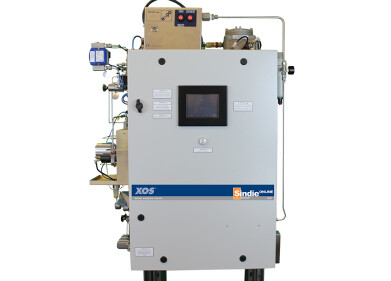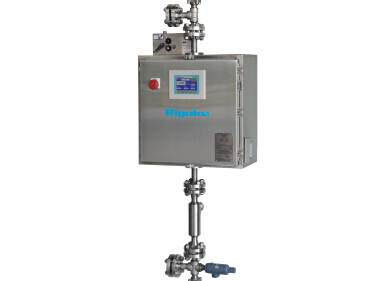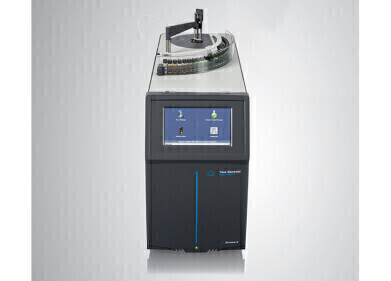-
 Table 1 an empirical calibration was built using a set of commercially available certified crude oil standards. A summary of the calibration for 0.1 – 1.0 S is shown using a measurement time of 100 sec.
Table 1 an empirical calibration was built using a set of commercially available certified crude oil standards. A summary of the calibration for 0.1 – 1.0 S is shown using a measurement time of 100 sec. -
_picture_2020.06.25.jpg)
Sulphur analysis
Sulphur analysis in crude by EDXRF
Dec 08 2020
Suphur content is regulated in many products and plays an important role in fuel quality and level of polluting emissions. Around the world regulations are limiting the amount of sulphur allowable in diesel fuels, kerosene, heating oils, etc., thus affecting the price and quality of crude oil based on sulphur content of the crude. Reliably characterising the sulfur content of crudes ensures proper quality for the various feedstocks at the refinery, and optimum blending ratios when blending different crudes to meet a desired sulfur concentration. Monitoring sulphur is also very important when characterising other similar oils, like residual oils and bunker fuels.
Energy Dispersive X-ray Fluorescence (EDXRF) technology enables rapid measurement of sulphur in crude. From the quantification of heavy elements in crude oil to sulphur in fuels to a variety of elements in lubricating oils, EDXRF is a well-established technique for petroleum and petrochemical analysis. The Rigaku NEX QC EDXRF analyser is a simple and versatile benchtop system for the analysis of sulphur and other elements in crude oil, petroleum oils and fuels. As a low cost analyser with unmatched performance-to-price ratio, the NEX QC system delivers excellent results for the measurement of crude oil and other heavy petroleum oils in air, without the need for helium purge.
Specifically designed for routine quality control applications, the NEX QC analyser offers an easy-to-learn software interface in a robust package specifically designed for the petroleum industry. Featuring an intuitive "icon-driven" touch screen for easy operation and a built-in printer for convenience the NEX QC analyser is optimised for routine determination of sulfur in oil.
The high-resolution, modern, user-friendly touch screen navigation and instrument control complement the expanded viewing area. From the simple results screen, the user can easily use a finger to scroll down to view the results detail - including the acquired spectra associated with the unknown sample. In addition to the usual elemental concentrations, this detailed information may be also be printed on the built-in thermal printer. The integrated computer and thermal printer provide full functionality without external devices, while built-in ethernet RJ-45 jack and USB port allow output to LIMS or other control systems, or to a memory stick. Data is available in either CSV or PDF formats.
The 50 kV X-ray tube and Peltier cooled semiconductor detector deliver exceptional short-term repeatability and long-term reproducibility with excellent element peak resolution. This high voltage capability, along with multiple automated X-ray tube filters, provides multi-element analysis capability for a wide range of applications along with low limits-of-detection (LOD). Options include, automatic sample changer, sample spinner and helium purge for enhanced light element sensitivity.
The NEX QC is capable of measurement more than just sulfur. Multi-element analysis is important for detecting crude oil contamination or adulteration, or monitoring the quality and grade of crude oil, which in part depends on the metal content as well as the sulfur content. The NEX QC analyser is ideally suited for the analysis of sulphur, as well as nickel, vanadium and iron in crude, residual oil and marine fuels.
The Rigaku NEX QC complies with the following international standards test methods for measuring sulfur in crude, as wells as in bunker fuel, diesel and other petroleum raw materials and refined products and petroleum oils. (Note that by weight 1 ppm = 1 mg/kg.)
- ASTM D4294-10 : 16 ppm – 5wt%
- ISO 20847 : 30 – 500 mg/kg
- ISO 8754 : 100 mg/kg – 5wt%
- IP 496 : 100 mg/kg – 5wt%
- IP 336 : 100 mg/kg – 5wt%
- JIS K 2541-4 : 0.01 – 5wt%
The example shown in Table 1 an empirical calibration was built using a set of commercially available certified crude oil standards. A summary of the calibration for 0.1 – 1.0 S is shown using a measurement time of 100 sec.
Digital Edition
PIN 26.1 Feb/Mar 2025
March 2025
Analytical Instrumentation - Elemental Analysis for Quality and Process Control at Refineries, for Lubricants and Wear Metals in Engine Oils - Synthetic Lubricants: New Developments - Scaling...
View all digital editions
Events
Apr 08 2025 Birmingham, UK
Apr 08 2025 Kielce, Poland
Apr 08 2025 Ravenna, Italy
Apr 08 2025 Southampton, UK
Apr 08 2025 London, UK
_picture_2020.06.25.jpg)



















